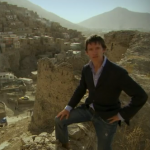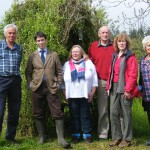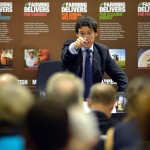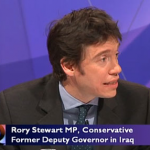CUMBRIA AT CONSERVATIVE PARTY CONFERENCE
Cumbria and its unique position as the only rural vanguard for the government’s ‘Big Society’ was a key issue at this week’s Conservative Party Conference in Birmingham. It was debated at a variety of main-stage and fringe events and widely cited by members of the government.
On Sunday October 3rd Rory Stewart MP chaired a packed ResPublica debate entitled “The Big Society in Cumbria: A Rural Case Study”. The unusual regional focus, the high-level speakers and the large crowd – it was standing room only – reflected the new importance of Cumbria and Eden in the government’s Big Society initiative. Greg Clark MP (Minister of State for Decentralisation and Planning Policy), Lord Wei (Government Advisor on the Big Society), journalist Matthew Parris also spoke at the Cumbria event. The event, attracted considerable media attention from TV coverage to websites.
The event was fully sponsored by local Cumbrian businessman Phillip Day of Edinburgh Woollen Mill. MP John Stevenson of Carlisle joined Cumbria County Councillor Duncan Fairbairn, businessman Trevor Hebdon and many other Cumbrians at the event. There were also presentations by Kirkby Stephen residents Libby Bateman and Tom Woof of the Upper Eden Community Plan (UECP).
Rory expressed his pleasure at seeing so many Cumbrians in the audience, and used his introductory speech to explain the concept of Big Society with Cumbrian examples.
Rory said: “Big Society is not a replacement for government. It may have the effect of saving government money, but that it not its purpose. Cumbrian Big Society has powerful examples to share with the rest of the country. I am so pleased that Cumbria was able – with the generous support of Philip Day – to have this event.”
Tom Woof, Chairman of the Upper Eden Community Plan said: “I was pleased to be given a chance to talk about the UECP and the ‘reality on the ground’. I urge the government to be bold and back Councils over Whitehall, and community groups over Councils.”
Cumbria continued to feature in other events. Broadband Minister Ed Vaizey signalled out the Penrith and the Border broadband initiative for praise three times in his speech, describing the recent Rheged conference and the new plans it produced as ‘brilliant’.
Rory also spoke about the importance of Cumbrian local parish councils at the Demos event “From rhetoric to reality: building the Big Society” on Tuesday October 5th and at the National Association for Local Councils (NALC) – “What is Localism?” discussion on October 3rd.
Rory commented: “Everything – from organising communities to building affordable housing projects or generating renewable energy – benefits from a democratic body. Big Society believes that local decisions are more informed, popular and practical than government traditionally imagines. However, responsibility is mutual: if parishes are given more power, they should also learn to take the larger public view and consider the consequences of their decisions beyond the parish line.”
Rory described the conference events as a ‘great success’ and said: “Civil servants have been seconded to Eden to work with me on these projects to ensure that they succeed, and we hope to be able to publicise what has been achieved so far in early November.”
Libby Bateman, UECP’s project officer added: “I was astounded at the amount of interest the ‘Big Society’ concept is stirring across all areas of government. At home we are focusing on grassroots, community-led projects which will make a difference to our lives in rural Cumbria, but the fact of the matter is that outside, the government is focusing on our communities. There is an enormous window of opportunity open to us at the moment and it is essential that we grasp it with both hands and maximise our potential to deliver via the ‘Big Society’ concept.”











